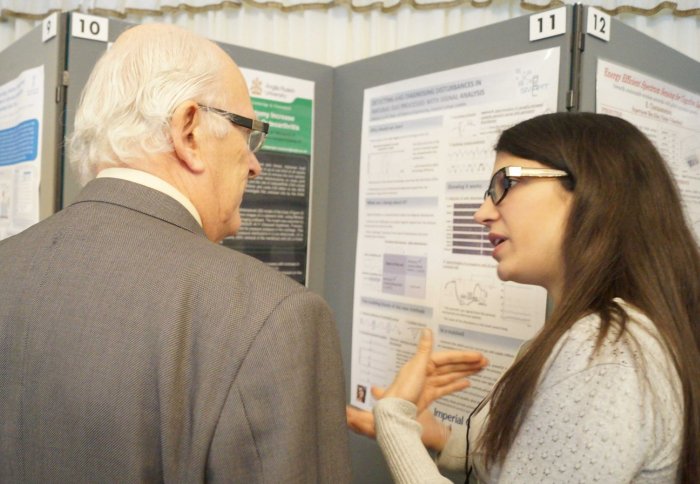Early career researchers descend on parliament

Miss Ines Cecilio, a PhD candidate in the Department of Chemical Engineering with Brian Iddon MP
Last month the House of Commons hosted a group of early career researchers, including 16 from Imperial, who presented their science to politicians.
As part of the SET for Britain event, held on 18 March, 180 presenters were entered into categories, namely engineering, biological and biomedical sciences, chemistry and physics after being shortlisted from hundreds of applicants.
On presenting his research, Dr Davide Fabozzi (Chemical Engineering), a Marie Curie Experienced Research Fellow, said: “It was a unique opportunity. My research deals with one of the greatest challenges of our era: the integration of renewable energy resources.
While my work addresses the scientific aspects of the problem, ultimately it is the politicians who set the policies for our future. I am hopeful that fruitful discussion may come from the interactions with MPs.”
Miss Inês Cecílio, a PhD candidate also in the Department of Chemical Engineering (pictured with Brian Iddon MP), presented a poster on her research into new signal analysis methods for monitoring the production of natural gas. “It’s a chance to help demystify the idea of science as unreachable and inapplicable, and to draw the attention of our leaders and the wider public to the key role of scientific research to social and economic growth.”
Andrew Miller MP, Chairman of the Parliamentary and Scientific Committee, said: “These early career engineers are the architects of our future and SET for Britain is politicians’ best opportunity to meet them and understand their work.” SET for Britain was established by Dr Eric Wharton in 1997. Following his untimely death in 2007, the Parliamentary and Scientific Committee, with support from the Royal Academy of Engineering, the Institute of Physics, the Society of Biology, the Royal Society of Chemistry, the Physiological Society and the Society of Chemical Industry, is working to further his legacy.
Other Imperial researchers that presented work at SET for Britain include:
- Caroline Clark (Physics) who is working with other scientists to launch a balloon-borne experiment from Antarctica to investigate the physics of the early universe.
- James Garvie-Cook (Physics) who researches the behaviour of ultracold gases.
- Eva-Maria Graefe (Mathematics) who presented a poster called 'There's a hole in my quantum bucket'.
- Dr Nicholas Hylton (Physics) who discussed how his research in nanotechnology could improve the efficiency of solar energy cells.
- Gabriele Messori (Physics) who researches how the Earth's atmosphere transfers heat from the warm tropical regions to the cold polar ones, and how this can affect the climate system.
- Dr Murugesan Muthu (National Heart and Lung Institute) whose research includes designing synthetic collagen in the laboratory.
- Leon Vanstone (Aeronautics) who carries out research about the aerodynamics of rockets.
- Stephanie Walton (Physics) who researches materials called 'Artificial Spin Ice' that are made up of tiny magnetic components.
- Also: Alexander Bondke (Chemistry), Robert Nyman (Physics), Khandaker Rahman (Materials), Bob Schroeder (Chemistry), Stefan Truppe (Physics), Anna Zecharia (Life Sciences).
Article text (excluding photos or graphics) © Imperial College London.
Photos and graphics subject to third party copyright used with permission or © Imperial College London.
Reporter
Andrew Czyzewski
Communications Division
Simon Levey
Communications Division